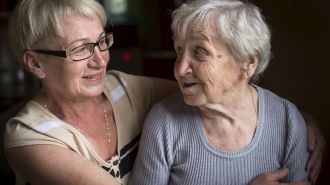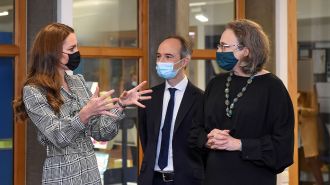- Our studies
- Our research
- Publications and resources
- Data access and training
- About
- News
- Events
- Get in touch
- Join our mailing list
Welcome to our news and blogs section. Here you’ll find the latest developments and insights from across our longitudinal studies.
Growing Up in Digital Europe (GUIDE) is the UK pilot of a major European initiative to create internationally harmonised data for research on child development and wellbeing.

Private school pupils in England do not tend to report better mental health or greater life satisfaction in early adulthood than their state-educated peers.

Only children can manage the emotional and psychological demands of caring just as well as those who share duties with siblings, according to UCL researchers.

The onset of menopause before age 45 reduces months spent in work by 9% – around 4 months’ employment – for women during their early 50s, finds new research by the UCL Social Research Institute.

Differences in birth weight and pregnancy term between medically assisted reproduction and naturally conceived children become insignificant once family circumstances are considered, according to new research by the UCL Centre for Longitudinal Studies and the University of Utah.

Women who are the first in their family to graduate from university earn 7% less in their mid-20s compared to female graduates whose parents attended university. In contrast, first generation male graduates tend not to face a similar pay penalty.

Researchers tracking the experiences of the millennial generation can now explore a wider range of questions related to the financial costs and benefits of attending university, thanks to newly linked admin and Next Steps survey data.

Researchers can now search and explore a complete set of variable metadata from all sweeps of Next Steps, the only national longitudinal study tracking the lives of the millennial generation.

Her Royal Highness, The Duchess of Cambridge today visited CLS to learn about the new Children of the 2020s study, and the invaluable contribution the centre’s existing birth cohort studies have made to our understanding of early child development.

A new study, based on longitudinal data, has found that people who had higher pre-pandemic levels of depression or anxiety have been more severely affected by disruption to jobs and healthcare during the pandemic.

National Curriculum Key Stage 2 tests taken by 10- and 11-year-old children in England to assess progress in English and mathematics do not seem to affect children’s wellbeing, according to new research based on the Millennium Cohort Study (MCS).

Tens of thousands of secondary school pupils across England will be invited to take part this week in COSMO – the largest study of its kind into the effects of COVID-19 on a generation of young people.

Researchers from around the world have been using CLS study data to tackle important questions. Here is a round-up of nearly 100 new pieces of research that we’ve added to the CLS bibliography between April and June 2021.
Ryan Bradshaw
Senior Communications Officer
Phone: 020 7612 6516
Email: r.bradshaw@ucl.ac.uk